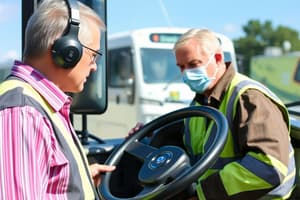Podcast
Questions and Answers
What should you do whenever you stop for a break during your trip?
What should you do whenever you stop for a break during your trip?
Check critical items such as the tires, brakes, and cargo tie-downs.
High beams should be used when:
High beams should be used when:
- In foggy conditions
- Within 500 feet of an approaching vehicle
- Always
- It is safe and legal to do so (correct)
Where is the safety release valve located?
Where is the safety release valve located?
On the air tanks.
Which of these is a proper use of vehicle lights and flashers?
Which of these is a proper use of vehicle lights and flashers?
What is a key steering component?
What is a key steering component?
How can you start moving without rolling backward?
How can you start moving without rolling backward?
Which is NOT one of the basic skills required for operating a commercial motor vehicle?
Which is NOT one of the basic skills required for operating a commercial motor vehicle?
What is the average reaction distance at 55 mph?
What is the average reaction distance at 55 mph?
What is the most common cause of serious vehicle skids?
What is the most common cause of serious vehicle skids?
The distance you should look ahead of your vehicle while driving amounts to about _____ at highway speed.
The distance you should look ahead of your vehicle while driving amounts to about _____ at highway speed.
Where should you place the three reflective triangles when parked on a level, straight, two-lane road?
Where should you place the three reflective triangles when parked on a level, straight, two-lane road?
What is the consequence for your first DUI offense while driving a commercial vehicle?
What is the consequence for your first DUI offense while driving a commercial vehicle?
What do front end header boards do?
What do front end header boards do?
What is the formula for stopping distance with air brakes?
What is the formula for stopping distance with air brakes?
Which statements about driving in areas with strong winds is true?
Which statements about driving in areas with strong winds is true?
Which statements about crossing or entering traffic with a heavy vehicle is true?
Which statements about crossing or entering traffic with a heavy vehicle is true?
What should you do if a vehicle continues to drive in your blind spot?
What should you do if a vehicle continues to drive in your blind spot?
If you are driving a 40-foot vehicle at 45 mph, what is the least amount of space you should keep in front of your vehicle?
If you are driving a 40-foot vehicle at 45 mph, what is the least amount of space you should keep in front of your vehicle?
What does axle weight mean?
What does axle weight mean?
What is the new BAC for commercial drivers to be considered intoxicated?
What is the new BAC for commercial drivers to be considered intoxicated?
Which statement about brakes is true?
Which statement about brakes is true?
What is a good rule to remember in a traffic emergency?
What is a good rule to remember in a traffic emergency?
What does a red triangle with an orange center on a moving vehicle's rear indicate?
What does a red triangle with an orange center on a moving vehicle's rear indicate?
When should the parking brake be tested?
When should the parking brake be tested?
What must be done with a driver's log if required?
What must be done with a driver's log if required?
What can under-loaded front axles cause?
What can under-loaded front axles cause?
What should you do when your vehicle hydroplanes?
What should you do when your vehicle hydroplanes?
What should you look for while traveling down a long, steep hill if your brakes fail?
What should you look for while traveling down a long, steep hill if your brakes fail?
What is true about certain types of cargo such as hanging meat?
What is true about certain types of cargo such as hanging meat?
Flashcards are hidden until you start studying
Study Notes
Basic Vehicle Inspection and Safety
- Check critical components like tires, brakes, and cargo tie-downs during breaks.
- Perform e-route inspections to identify issues such as heat signs in tires, wheels, and truck body.
Use of Vehicle Lights
- High beams should be used legally and safely, and not within 500 feet of an oncoming vehicle.
- Flash brake lights to warn following drivers of hazards or when slowing down.
Safety Equipment and Vehicle Operation
- The safety release valve in air tanks operates at pressures above 150 PSI, preventing excess pressure.
- Proper vehicle lighting includes turning on headlights in reduced visibility due to rain or snow.
Driving Techniques and Skills
- To prevent rolling backward when starting, engage the clutch, apply the trailer brake, and utilize the parking brake as needed.
- First-aid certification is NOT a basic skill required for operating commercial vehicles.
Vehicle Dynamics and Distances
- Average reaction distance is approximately 61 feet at 55 mph (0.75-1 second).
- At highway speeds, look ahead for about 1/4 mile (12-15 seconds).
Parking and Stopping Regulations
- When parked on a two-lane road, place three reflective triangles: one within 10 feet of the rear, one 100 feet behind, and one 100 feet ahead.
- A first offense DUI while driving a commercial vehicle typically results in a 1-year suspension of the CDL.
Cargo and Vehicle Structure
- Front-end header boards, or headache racks, shield drivers from cargo movement during collisions.
- Stopping distance with air brakes combines perception distance, reaction distance, brake lag distance, and braking distance.
Wind and Traffic Considerations
- Strong winds can significantly affect vehicle control, particularly for lighter vehicles coming out of tunnels.
- Heavier vehicles require larger gaps in traffic due to slower acceleration; ensure gap is sufficient for safe entry.
Defensive Driving Strategies
- If a vehicle remains in your blind spot, slow down to allow it to exit the area.
- Maintain a safe following distance of at least 5 seconds for vehicles at higher speeds.
Vehicle Weight and Regulations
- Axle weight refers to the weight transmitted to the ground by one axle or a set of axles.
- The legal BAC limit for commercial drivers is 0.04%.
Brake Safety and Emergency Situations
- Heavier or faster vehicles generate more heat during braking, requiring careful brake management.
- In a traffic emergency, turning can often be quick than stopping.
Identifying Slow-Moving Vehicles
- A red triangle with an orange center indicates a slow-moving vehicle.
Vehicle Testing and Inspection
- Test parking brakes while parked to ensure they hold; if not, they may need repairs.
- A driver's log must be presented immediately upon request during inspections.
Load Management and Handling
- Under-loaded front axles can lead to poor traction and steering difficulties.
- To regain control during hydroplaning, release the accelerator and avoid using brakes.
Emergency Procedures
- In the event of brake failure while descending a hill, seek out escape ramps or routes marked on the road.
- Certain types of cargo, like hanging meat, require special driving caution due to stability issues on turns.
Studying That Suits You
Use AI to generate personalized quizzes and flashcards to suit your learning preferences.




